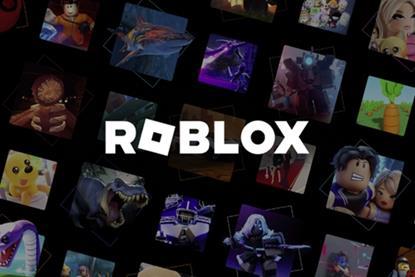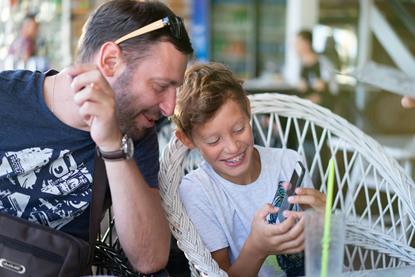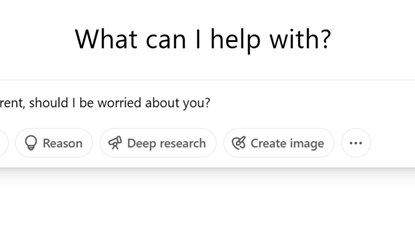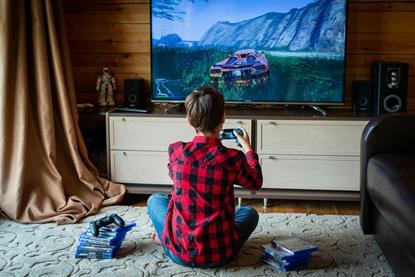Technology
From TikTok trends to screen-time limits, technology is an ever-changing landscape that affects every family. This section explores how Christian parents can stay informed and make wise decisions about apps, smartphones, gaming, social media, and digital habits — helping your children thrive in a tech-driven world while staying grounded in their faith.
Christian parents need to engage with Roblox not simply fear it
Roblox is one of the most popular computer games on the planet. It comes with risks and opportunities to be aware of - Ben Jones from Missional Generation helps Christian parents get to grips with this phenomenon and see the possibilities for faith formation
Dreaming of escape won’t solve the tech battle for Christian parents
Juggling smartphones, social media rules, and the dream of escape, Andrea Zanin explores why finding balance—not blanket bans—is the messy reality for families raising kids in a tech-obsessed world
Why I won’t be signing a smartphone free childhood pledge
Robin Barfield highlights the hidden costs of blanket bans, the importance of digital literacy, and why real safety comes from equipping children, not just restricting them
5 tips for Christian parents to manage kids’ screen time
If a social media ban comes in to the UK it won’t be the end of the conversation - the amount of time youth and children spend on screens will still be something that parents have to think carefully about - Joanne Gilchrist is on hand to help
4 ways to prepare your teenager for a social media ban
Support for a social media ban for under 16s in the UK is growing quickly - Sandeep Louise suggests Christian parents get ready for it now
When divorce hits home, children need people not chatbots
As new AI platforms like Split Happens emerge, Kate Orson warns that only real relationships and Christ-centred care can address the deep wounds of family breakdown
5 ways Christian parents can help their youth and children combat the impact of social media algorithms
Christian parents can help their children broaden their sources of online information - Andy Flannagan explains how
How Christian parents can help their families navigate political turmoil
Andy Flannagan offers hope to Christian parents who are concerned about the impact of the culture wars on their children and young people
3 ways Christian parents can take the lead on healthy smartphone use in their family
To combat the negative impact of smartphone use Sandeep Louise encourages parents to set the example for their youth and children to follow
Wizz, the latest app for young people presents some issues that Christian parents will want to know about
Youth Culture Specialist from Urban Saints, Nesu Kwaramba, helps Christian parents consider the issues with the latest app taking youth culture by storm
AI will change the job market for our children but Christian parents needn’t fear
AI is set to revolutionise the job market - Kate Orsen reflects on how Christian parents can think through the challenges this poses for their youth and children
4 ways Christian parents can engage with the latest TikTok trend: Aura farming
Alice Pinney digs into this latest iteration of online image curation and has helpful reflections for Christian parents
As a Christian parent I don’t put my children on social media - this is why
I once listened to a children’s sermon about the power of our words and the harm they can cause. To illustrate his message, the pastor used a tube of toothpaste. He squeezed all of it out onto a tray, then asked one of the children to put the toothpaste back into the tube. Naturally, they couldn’t do it—once the toothpaste is out, it can’t be put back. His point being that the same is true of our words, once spoken they can’t be taken back. In today’s digital age, it seems the same holds true for what we share online—once something is posted, it’s nearly impossible to take it back. While some platforms like Snapchat automatically delete messages after a certain time (unless saved), one has to wonder: are these records ever truly gone?
Raising youth and children in the age of AI: A Christian parent’s guide
AI such as ChatGPT can be fascinating for children and young people. It can deliver a wealth of information in split seconds and can even be conversed with. But with ethical concerns about plagiarism, reports of AI addiction, and even the threat of AI becoming sentient, how should we talk to our children about AI?
Addicted, anxious and online: What every Christian parent needs to know about social media and wellbeing
When 15-year-old Anna decides to embark on a fitness regime, she soon discovers social-media posts offering nutrition advice. Embracing her new healthy lifestyle enthusiastically, she begins sharing her progress online. Within weeks, she finds herself scrolling through dieting regimens. As well as working out at the gym, she begins limiting her food intake. Her social media use quickly spirals from anorexia and bulimia sites onto pages promoting self-harm.
When Sephora meets Scripture: Helping our girls see true beauty
It was November 2024, that time of year when I ask my children for their Christmas lists to avoid any disappointment on 25th December. But this year felt somewhat different with my three daughters. As I scanned their lists, I found myself searching in vain for the familiar comforts of LOL Dolls, Barbie Dreamhouses, and Lego Friends sets. Instead, I was met with a line-up of brand names completely foreign to me — Laneige, Bubble, Rhode, Sol de Janeiro, Drunk Elephant, Fenty, Mario Badescu (had Ken been replaced by a Romanian counterpart?). Then it struck me, with a twinge of sadness, that my daughters had quietly moved beyond the innocent world of toys, trading them for the sophisticated realm of skincare and beauty products. Even my nine-year-old, surprisingly well-versed in the world of luxury brands, appeared caught up in this early wave of consumer savvy. It left me wondering: were they growing up too fast, or was I simply unprepared for how childhood itself has evolved?
Taming gaming: A faith-based approach to video games at home
Games are a helpful way to entertain children between the more important parts of family life, school or church life, but we need to be careful they don’t take over. Such advice was ringing in my ears when I started writing my book, Taming Gaming. I wanted to get to the bottom of what advice parents, carers and youth workers really needed about video games.
3 ways parents can get teenagers thinking about AI and faith
Every day, we’re using tools that felt like science fiction just a few years ago. Do you have a textbook chapter or article you don’t understand? AI will turn it into an entertaining podcast. Fancy a song? AI will write music from thin air. Say “make me a video,” and sure enough, it will. Not always great, but frighteningly fast… and getting better by the day.
Beyond the endless scroll: Protecting your teen’s heart on TikTok
TikTok, known for its viral trends and challenges, has quickly become one of the most popular social‑media apps among young people. British teens spend an average of two hours a day on TikTok. With its creative, fast‑paced content and personalised algorithm, it’s no surprise that teens devote so much time to the app. However, such a time commitment inevitably shapes how they think, grow, and interact with the world.
The online world: Friend or foe for Christian youth and children?
We are all increasingly aware of the role that online spaces play in our daily lives – from shopping to entertainment, work to recreation, and even chatting with the postie through the doorbell. Life is now lived in a hybrid reality that is here to stay.
Helping your teen navigate Snapchat: A Christian parent’s guide to helping them flourish online
In today’s digital world, social media is a big part of many teens’ lives. Snapchat, with its disappearing messages, fun filters, and real-time updates, is particularly popular among young people. While these features can offer entertainment and connection, they also bring risks that parents need to be aware of. As Christian parents, it can be challenging to help our teens navigate platforms like Snapchat while keeping them safe, grounded in faith, and aware of the potential dangers. This guide will help you find that balance.
Are smartphones rewiring my kid’s brain?
Robin Barfield wonders if Christian parents are sometimes a little too negative on the impact of smart phones and social media. For an alternative perspective click here.













































